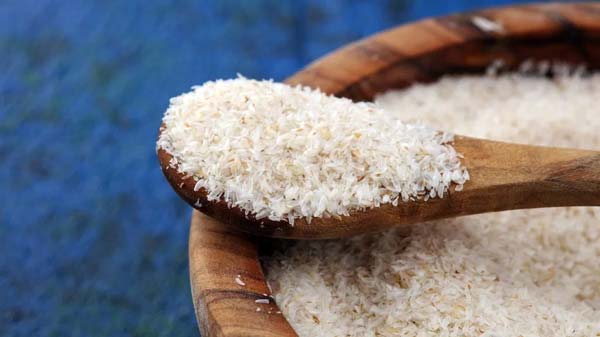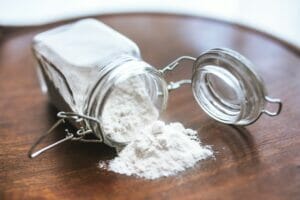Health-conscious people are not oblivious to the usefulness of adding psyllium husk powder in their diet routines. It has been used for centuries in order to improve one’s physical soundness and digestive system. Besides, this powder makes an excellent ingredient for gluten-free recipes.
However, it can be hard to find in some areas, or you can run out of it pretty fast! So what can be an ideal replacement for psyllium husk powder?
In this guide, we have answered that question for you by compiling a brief list of all possible solutions. You can find the one that works the best from here and continue your healthy lifestyle!
What is Psyllium Husk Powder?
The main ingredient of this powder – psyllium, is a native crop from the western states of India, Mediterranean Europe, Pakistan, and Africa. Its name originates from “psulla” – a Greek word meaning flea since that’s what its seeds look like. The scientific name for this plant is Plantago Ovata. From one of these plants, you can get around 15,000 psyllium seeds!
They are then transformed into husks through gathering and harvesting. The next step of this annual practice is to make the husk into powder. This is the psyllium husk powder you get from the markets.
It is mainly known as a powerful natural source of fiber that helps resolve constipation, diabetes, weak metabolism, and overweight conditions.
Top 10 Psyllium Husk Substitute That You Should Try
1. Flaxseed

The closest replacement you can get for psyllium husk powder is flaxseed or linseed. It suits both vegan and gluten-free diets for cooking or baking. You can use it for making the pizza dough or pie crust thicker and stronger. The exterior can be crispier if you add this as a dessert topping or while breading foods.
If you are looking for a replacement for egg whites, flaxseed can also be a probable solution. By mixing it with water, you will be able to attain the same consistency.
In terms of nutritional values, flaxseed proves to be an ideal substitute because of its high fiber content. So you can enjoy the same benefits from it as you did with psyllium husk powder.
Besides, it brings in great portions of fat, Vitamin B, and multiple minerals. Just one ounce of flaxseed contains 12 grams of healthy fats. Its richness of antioxidants such as lignans, zeaxanthin, and lutein can save your cells from free radicals and boost cardiovascular health.
2. Xanthan Gum
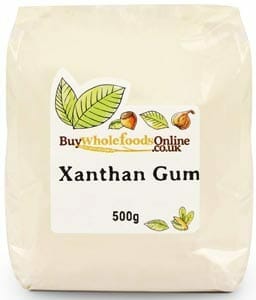
Even though this item is termed as “gum,” it is nothing like the one you are used to chewing!
Xanthan gum is in fact a powder that makes a liquid much thicker once you mix them together. Although this is its main use, the powder also helps to keep all your ingredients together while baking.
Chemically, it is categorized as a polysaccharide. The simple sugars are fermented and then synthesized into the powder using a particular bacterial species named Xanthomonas campestris. This is where xanthan gum gets its name.
While it can be a commendable replacement for psyllium husk powder in cooking, xanthan gum does not offer the same nutritional value.
Along with its impact on proper consistency and baked items, you can rely on it to keep you satiated for a long time. Being a great soluble fiber, it can make the consumer feel full and prevent excessive eating. As a result, including xanthan gum in your diet will make it easier for you to lose weight and keep the lost weight off.
3. Cornstarch
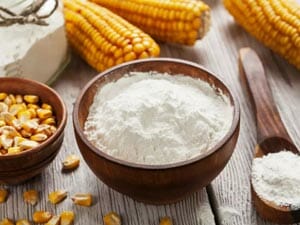
Cornstarch is one of the common ingredients in any kitchen where sweet and spicy items are cooked often. Professionals and food manufacturing brands use it as well to produce processed food items.
Its main function is usually thickening the dish or providing it with the right consistency. The most common recipes where cornstarch can help include gravies, custards, and pie fillings.
Additionally, it is used to keep powdered and granulated food items from clumping together. It protects the item from moisture as well.
However, cornstarch is not an ideal solution for recipes involving acidic elements. For instance, if your dish includes lemon, you will need to use another substitute from our suggestions.
Besides, make sure it is free of lumps before mixing in and doesn’t form clumps once added. Keep stirring until the mixture becomes smooth.
4. Chia Seeds

Similar to flaxseed, another soluble fiber that comes in the form of seeds is chia seeds. They are also filled with omega-3 fatty acids, which help your heart fight against any cardiovascular disease. Taking them regularly can keep your blood pressure on healthier levels.
When you get them from a local store or order a pack online, it doesn’t look like much. However, once you put them in water for a while, they swell up and become the perfect companions for your breakfast or dessert. It is a common practice to leave a handful of them in water overnight for use the next day.
A delicious dish used by chia seeds is chia pudding. Other popular food items made with it include healthy smoothies and gluten-free recipes. In order to use them as psyllium husk replacements, you can grind them into a finer texture and add spoonfuls of them as thickeners.
The only drawback might be its strong taste. You will need to adopt a few tricks to mask that distinct flavor in the dishes. Don’t miss out on the rich content of minerals, fiber, and other nutrients offered by these seeds!
5. Almond Flour
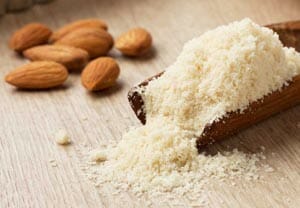
Almond flour is a popular and almost staple ingredient in many modern diets like Keto. It replaces the usual flour and brings in a healthier approach to eating by instilling more nutritional values in each meal! This flour is very low in carbs and thus doesn’t pose much risk of gaining weight rapidly.
As the name suggests, it is prepared by crushing almonds which hold lots of nutrition. Along with fiber, it also provides you with healthy doses of fat and protein. Among other nutrients, almond flour offers minerals like magnesium and manganese, as well as vitamin E. So each spoonful of this will be packed with nourishment!
There is a risk factor, though. Baking with almond flour may lead to undesirable results since it can easily make the baked item much harder than you intended. This happens since it has a dense concentration of oils and proteins. You may also struggle a bit with making the bread fluffy with this flour.
However, it works great for breading meat and preparing thicker food items like brownies. Since it is prepared from almonds, you cannot use this as a psyllium husk substitute for those who have a nut allergy.
6. Coconut Flour
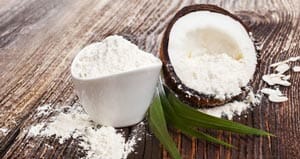
Just like our previous option, coconut flour is also an amazing substitute for general flour. This is in fact safer than the almond one since anybody can consume it - even by the ones allergic to nuts. It also has gluten-free properties, just like psyllium husk powder.
This flour is prepared by crushing dry coconut meat into a fine powder. Just like the original fruit, this powder is also full of macronutrients like healthy fat, protein, and fiber. You will find micronutrients like manganese and antioxidants in there as well.
Because of its high content of dietary fiber and fats, consuming items prepared using coconut flour will keep you full for a long time. You will not have constant cravings every now and then by including them in your regular diet.
Since it can absorb liquids too fast and retain them, try to mix the flour with eggs in your recipe. This will bring down the dryness, leaving your food easier to chew and swallow.
7. Arrowroot Powder
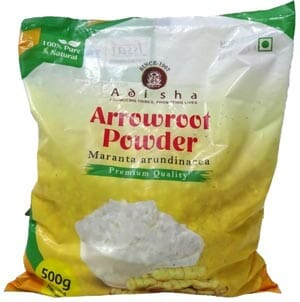
Even though arrowroot is relatively unknown to the masses of western nations, it is actually cultivated in many areas around the world! This international star of starches has its humble origins in many tropical tubular plant species spread out in different countries.
Starting from the Victorian era, arrowroot has been used in preparing an interesting array of food items like pudding, cake, biscuit, jelly, and hot sauce. As you can see, there is hardly any limit to what you can cook or bake with arrowroot powder!
You can use it either as a thickener or a binder. Since the powder doesn’t have a taste of its own, you don’t have to worry about it ruining your culinary perfection. Add water to it for making your gravies and fillings more appealing to people. It also works well with acidic elements, which is something cornstarch can’t do.
Along with being a good psyllium husk powder substitute, it can also be used to replace ingredients made from corn like cornstarch. This especially applies to the followers of the Whole30 or paleo diet. Besides, it is also free of gluten, nut, dairy, and soy!
8. Tapioca Powder
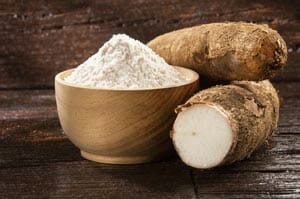
If you are a fan of pies and sauces, you can give tapioca powder a chance! It is also available as flour or starch. The pulp of cassava - a tuber vegetable with a nutty flavor - is washed and squeezed to extract the tapioca starch. After getting rid of the liquid through evaporation, the residual becomes tapioca flour.
You will find them very easy to digest and free from typical allergens. Contrary to almond flour and coconut flour, tapioca flour will actually help you to gain weight! So if you are unhappy with the mass your body has accumulated over the years, this ingredient can be a great replacement for psyllium husk powder!
When it comes to nutrients, tapioca powder is surely packed with starchy carbohydrates. In addition to that, it also contains the goodness of calcium and iron. You can get 30.4 mg calcium and 2.4 mg iron in a cup of this powder which are great values for daily intake.
9. Potato Starch
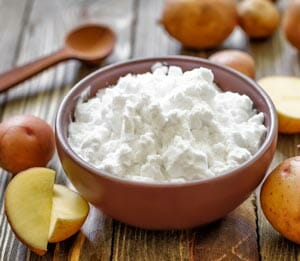
Potato is undoubtedly one of the most popular and easily accessible tubers across the planet. Almost any country can cultivate it easily and the consumers can stock them up for a variety of dishes. The potato starch is extracted from these root vegetables by obtaining their leucoplasts or starch grains.
Including it in your recipe can boost your metabolism and improve your gut microbiome. Being a resistant starch, it prevents the food from getting digested in the small intestine and reaches the colon to meet the gut bacteria. Other advantages include lowering blood sugar levels and improving insulin sensitivity.
Also read: Which one to choose between potato starch & potato flour.
10. Guar Gum
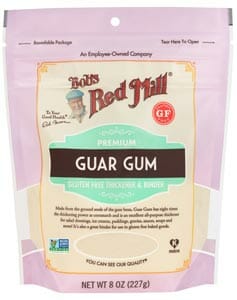
Guar gum may not be a household name in this part of the world, but it has been a known source of carbs for centuries in others.
This particular polysaccharide comes from an African plant that is now cultivated in the South-Asian countries as well. The main source is a bean or legume, which has earned many names over the years. Guar gum is extracted from these beany vegetables in order to be used as a thickener and stabilizer.
Their seeds are processed through factories where the machines dehusk, hydrate, and mill them to reach the end result. Guar gum is basically a soluble off-white powder made primarily of sugars. You can use it for baking since it improves texture and increases shelf life.
11. Others
There are some other potential alternatives for psyllium husk powder. However, they are less popular because they might lack the same nutritional values or baking properties. But if you really don’t want to go for the options mentioned above, you can settle for rice flour, sorghum flour, dried plums, or grains instead.
Conclusion
Maintaining our health is not as effortless as it might seem to many. Ensuring proper nutrition and ingredients in daily meals is a must. That is why finding the right psyllium husk powder substitute is also important.
Along with the nutritional values, you can also factor in their contribution to cooking or baking while finalizing your choice. Pick the most effective replacement for the powder so that neither your recipes suffer nor your diet routine!
Related articles that you may like:
SeaRanchLodge.com is a participant in the Amazon Associate program and will earn from qualifying purchases.


